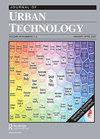折射都市主义:网络化城市的多重历史(以及地理)
IF 4.6
3区 经济学
Q1 URBAN STUDIES
引用次数: 1
摘要
本文探讨了历史在分裂的城市主义理论和更广泛的基础设施研究中的作用,以便更细致地理解支撑网络化城市的多重历史。我在《分裂的城市主义》一书中反思了历史作为一种论证策略的使用,批评了基础设施研究中过去的常见框架,并在此基础上为未来的城市基础设施历史学术制定了议程。在这样做的过程中,我认为,通过进化或回顾性的叙述来讲述基础设施历史的混乱会变得模糊。本文章由计算机程序翻译,如有差异,请以英文原文为准。
Refracting Urbanism: The Multiple Histories (as well as Geographies) of the Networked City
ABSTRACT This piece explores the role of history in the splintering urbanism thesis, and infrastructure studies more generally, to make the case for a more nuanced understanding of the multiple histories underpinning the networked city. I reflect on the use of history as an argumentative ploy in Splintering Urbanism, criticize common framings of the past in infrastructure studies, and map out an agenda for future scholarship on urban infrastructure histories based on this critique. In doing so, I argue that the messiness of infrastructure history gets obscured when told through evolutionary or retrospective narratives.
求助全文
通过发布文献求助,成功后即可免费获取论文全文。
去求助
来源期刊

Journal of Urban Technology
URBAN STUDIES-
CiteScore
8.50
自引率
4.20%
发文量
42
期刊介绍:
The Journal of Urban Technology publishes articles that review and analyze developments in urban technologies as well as articles that study the history and the political, economic, environmental, social, esthetic, and ethical effects of those technologies. The goal of the journal is, through education and discussion, to maximize the positive and minimize the adverse effects of technology on cities. The journal"s mission is to open a conversation between specialists and non-specialists (or among practitioners of different specialities) and is designed for both scholars and a general audience whose businesses, occupations, professions, or studies require that they become aware of the effects of new technologies on urban environments.
 求助内容:
求助内容: 应助结果提醒方式:
应助结果提醒方式:


